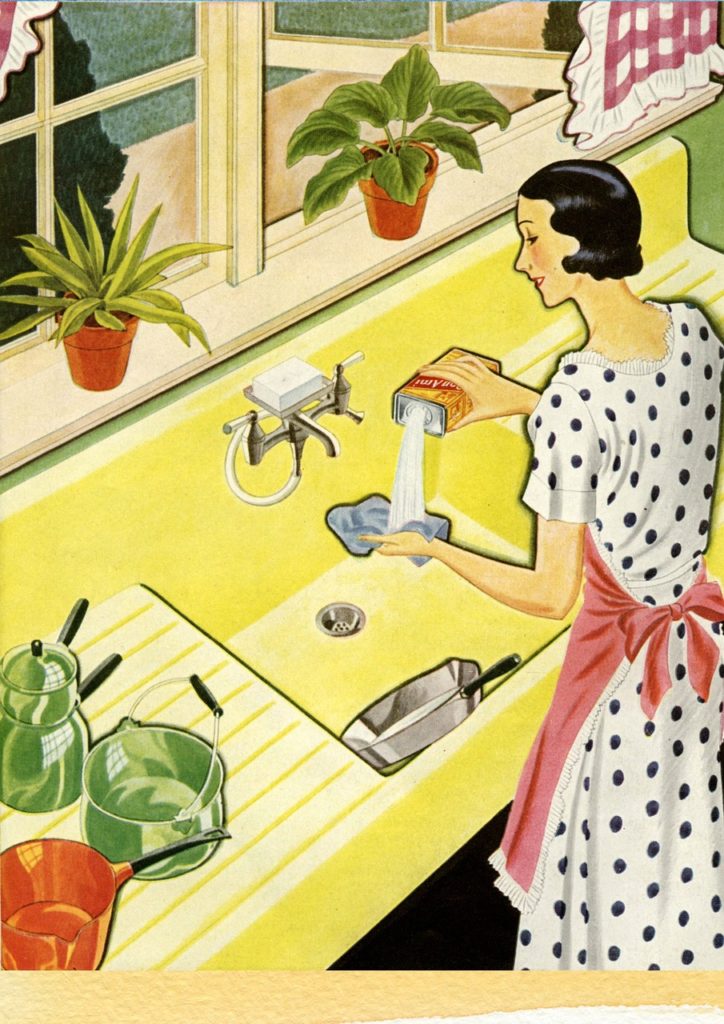When I wed for the second time, my hubby and I knew we wanted to have kids. We agreed that we wanted someone to be at home, and since he was older and much more established in his career than I was, we decided he’d be the breadwinner and I’d be the homemaker.
 Still, I worked part time when my boys were young, often working nights, when the hubs would care for our boys, and relying on babysitters for when I worked days. Even though I was the point gal for cleaning and caring, it seemed more flexible and less traditional than my parents’ 195os homemaker-breadwinner model.
Still, I worked part time when my boys were young, often working nights, when the hubs would care for our boys, and relying on babysitters for when I worked days. Even though I was the point gal for cleaning and caring, it seemed more flexible and less traditional than my parents’ 195os homemaker-breadwinner model.
So when I divorced after 14 years of marriage and had to re-enter the full-time workforce, at age 48, I was shocked and disappointed at the salaries I was offered — much lower than my male counterparts — and the reality of just what I’d given up to be the main homemaker began to sink in.
Don’t get me wrong — I loved caring for my boys and wouldn’t trade a second of my time with them, although, let’s face it —being the at-home person often feels quite isolating.
But when it came to what I lost financially, well, I have yet to recoup from that. Which is why older women overwhelmingly live in poverty.
We need to change that. But how?
Inequality in the home
I was hopeful that younger people, my 20-something kids’ generation, might make it happen. But then a new study indicates that well, maybe not. According to the New York Times:
Two-thirds of Americans and three-quarters of millennials say they believe that men and women should be equal in both the public sphere of work and the private sphere of home. … But the study revealed that roughly a quarter of people’s views about gender equality are more complicated, and differ regarding work and home. Most of them say that while women should have the same opportunities as men to work or participate in politics, they should do more homemaking and child-rearing, found the study, which is set to be published in the journal Gender and Society.
Really?
Women in 2018 — almost 2019 — should do “more homemaking and child-rearing”? Based on what? Please don’t give me that it’s more “natural” for us stuff; it isn’t.
This reminds me of a 2017 study by the Council of Contemporary Families in 2017 that found that since 2014, men between ages 18 and 25 were more likely than older guys to think that it’s better if women take care of the home and they be the breadwinners. Not surprisingly, 72 percent of women disagreed with that BS.
Sorry, gals — guess who wins in these scenarios?
Right …
What do women want?
Which makes me question, why?
- Do hetero women actually prefer the male breadwinner-female homemaker model?
- Do hetero women have any bargaining power in changing this dynamic (ie., do we feel free enough to state what we want from a partner, even going so far as to reject him if he’s not willing to commit to a fair share of household chores and childcare)?
- Should whoever does the bulk of the home chores and childcare be compensated, an idea that has been floated around for some time?
Clearly we need structural changes that support caregiving and value the unpaid labor that has often been performed under the guise of “love.” Societal changes move slowly, however; what I want to know is, what we can create right now within our own romantic relationships?
What would you like to see happen?
Want to have an equitable marriage? (Of course you do!) Then read The New I Do: Reshaping Marriage for Skeptics, Realists and Rebels (Seal Press). You can support your local indie bookstore or order it on Amazon.
















